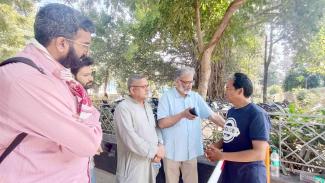Ladakh, nested high in the freezing Himalayas, has been facing a lot of heat for a while. The people of Ladakh are fighting an uphill battle to save their identity and their culture, and to protect the delicate ecology of this region from tourists and resource-sharks.
In 2019, the union government under Narendra Modi abolished Article 370 of the Constitution, which had given special status to Jammu and Kashmir. Furthering the politics of polarization and minority hatred was the sole purpose behind the move. At that time, prominent activists of Ladakh like Sonam Wangchuk were under the illusion that the abolition of Article 370 could open the way for Ladakh’s betterment by ending the decades-long neglect.
Soon it became clear that the abrogation of Article 370 has not only destroyed Jammu and Kashmir’s autonomy and statehood, but it has also laid the foundation for Ladakh’s destruction. The union government’s “integration” plan has led to an unprecedented tourist influx. During the tourist season, the local people are getting outnumbered by visitors. Large quantities of land have been taken over to build military infrastructure. The union government is all set to systematically exploit the natural resources in this area.
The abrogation of Article 370 reduced Ladakh to the status of a Union Territory without a legislature. The ongoing troubles have led Sonam Wangchuk and his comrades to prioritize the demand for political representation.
Sonam Wangchuk led a foot march from Leh to New Delhi, starting on September 1. The protesters were marching to Delhi to demand environmental and constitutional rights for Ladakh, including its inclusion under the Sixth Schedule of the Indian Constitution.
On September 30, Wangchuk and his supporters were detained by Delhi Police at the Singhu border. They wished to visit Wangchuk tweeted, “As we are approaching Delhi, it appears we are not being escorted, we are being detained.” The government stopped them from visiting Raj Ghat on 2 October. CPI-ML and Samyukta Kisan Morcha (SKM) leader Comrade Prem Singh, along with comrades of Local Committees, met the detained protestors on the following day and expressed their solidarity.
On October 6, Wangchuk began an indefinite fast at Ladakh Bhawan in Delhi, demanding the inclusion of Ladakh under the Sixth Schedule of the Indian Constitution. The police constantly harassed him and his comrades and prevented people from expressing solidarity. Despite the barriers, On October 9, Com. Dipankar Bhattacharya, along with Comrades Purushottam Sharma and N Balaji visited him and extended support Ladakh’s demands.
Com. Dipankar said that Sonam is on hunger strike for the last four days, but since we were not allowed to visit him, he came outside of the gate and we talked across the LoC! From Ladakh to Delhi, this is the state of democracy in India today!
"Their demands are simple and straightforward. Five years of UT status have convinced them that there can be no real democracy, dignity and development for the people of Ladakh till they get separate statehood along with Sixth Schedule status to protect the tribal population and the delicate Himalayan ecology, much like the North-Eastern states of Assam, Meghalaya, Mizoram and Tripura," Com. Dipankar added.
Later, an AISA-AIPWA team which included AIPWA Delhi President Shweta Raj and JNUSU President Dhananjay, visited him again and expressed their solidarity.
After 15 days, he ended his fast on October 21, 2024, following a letter from the Union Ministry of Home Affairs (MHA) assuring him that talks on Ladakh’s demands would resume on December 3, 2024. The struggle shall continue, he said, till their demands are met.
A protest was also organized by AISA and other Ladakhi students in solidarity with Wangchuk, where more than 70 protestors, including students from different universities and organisations including Ladakh Students' Union and AISA were detained on October 21.
CPIML stands with Ladakh’s fight for political representation and democratic rights and against the environmentally destructive capitalist predatory model of development. A federal framework ensuring real respect for India's diversity and giving real powers for self-management to India's indigenous people is the need of the hour for India to march ahead in the 21st Century to achieve comprehensive justice that includes climate and gender justice with the constitutional commitment of social, economic and political justice.











